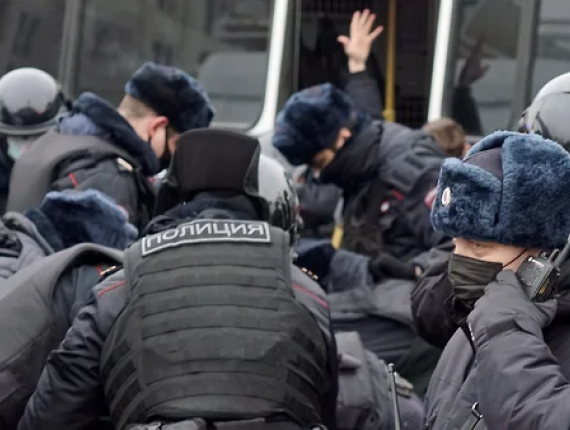Aleksandr Federyakov, a defendant in the «Palace Case», is a political prisoner
Federyakov has been sentenced to a year and a half in a penal colony. Investigators assert he fired pepper spray at a riot police officer during the protests on 23 January 2021
Memorial Human Rights Centre, in accordance with international guidelines defining the term ‘political prisoner’, considers the criminal prosecution of Aleksandr Federyakov politically motivated and unlawful. Federyakov is remanded in custody for his political beliefs and for exercising his right to freedom of assembly. The evidence for the charges against him is extremely weak. The fact that the court chose the most severe form of pretrial restriction and the sentence he has been given are clearly disproportionate to the offence with which he has been charged. Moreover, his prosecution has a selective nature, given the usual, ‘non-political’ practice with regard to the offence of use of force against a public official (Article 318 of the Russian Criminal Code).
We believe Aleksandr Federyakov should be immediately released and the criminal charges against him dropped.
- What are the charges against Aleksandr Federyakov?
On 23 January 2021 Aleksandr Federyakov took part in a protest in Moscow in support of Aleksei Navalny.
According to Federyakov, that day he walked along the boulevard from Pushkinskaya metro station to Trubnaya metro station. On the way, he saw several people being arrested but did not take part in the events himself. When he reached Trubnaya station he went down into the metro and went home.
According to the prosecution, at Trubnaya station Federyakov fired pepper spray in the face of a riot police officer. Criminal charges were brought against Federyakov for ‘use of violence, not dangerous to life or health, against a public official in connection with the performance of their duties’ (Article 318, Part 1, of the Russian Criminal Code).
On 31 March 2021 Federyakov was arrested and remanded in custody. On 9 August 2021 he was found guilty and sentenced to one year and six months in a general regime penal colony.
Federyakov maintains his innocence. He has said: ‘I consider myself innocent. The investigation did not provide any evidence of my guilt. My position is unambiguous: I am not guilty and it is important for me to show I am right. Maybe this will be an example of how a person is able to establish the truth in our justice system?’
- Why does Memorial consider Aleksandr Federyakov a political prisoner?
As evidence of Federyakov’s guilt, investigators presented a video recording of the alleged moment when pepper spray was fired in the direction of the riot police officer. The video, shot in poor light conditions, shows the back of a person wearing a dark hoodie. It is impossible to identify a person on the basis of this image: neither the face nor any particular features of the alleged offender are visible on the video.
The investigators have provided no other evidence of Federyakov’s guilt. No one was able to identify him, and there were no traces of pepper spray on clothes seized from his home.
Nevertheless, the court chose the most severe form of pretrial restriction for Federyakov and then sentenced Federyakov to one year and a half of imprisonment in a general regime penal colony.
Federyakov had no previous convictions. He is married with one young child.
The general practice for cases falling under the article of the Criminal Code concerning violence against a public official in ‘non-political’ cases is much milder and imprisonment is not usual.
All this indicates the obvious bias and selectivity in the criminal prosecution of Aleksandr Federyakov. Society is being given a clear signal: police officers are allowed to do whatever they like; ordinary people who dare to take part in protests will be punished with maximum severity.
Recognition of an individual as a political prisoner does not imply Memorial Human Rights Centre agrees with, or approves of, their views, statements, or actions.
More information about the case of Aleksandr Federyakov and the position of Memorial Human Rights Centre is available on our website.
- How you can help
Aleksandr Federyakov’s wife requests that people sign and distribute the following petition: ‘Freedom for Aleksandr Federyakov, charged in connection with the Palace case without the slightest evidence.’
Address for letters: СИЗО-1 г. Москвы, 107076, г. Москва, ул. Матросская тишина, д. 18 [in English: SIZO-1, 18 Matrosskaya Tishina St., Moscow, 107076].
Russia’s penitentiary system delivers to its prisoners only the messages written in Russian.
You can support all political prisoners by donating to the Fund to Support Political Prisoners of the Union of Solidarity with Political Prisoners via PayPal, using the e-wallet at [email protected].





